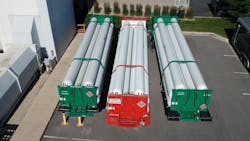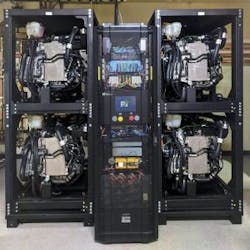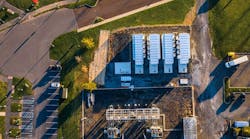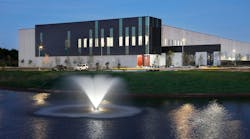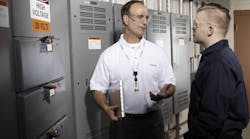Microsoft has successfully tested the use of hydrogen fuel cells to power its data center servers, a first step toward adopting new technologies to eliminate the use of diesel fuel in its emergency power systems, the company said Monday.
The company called the test “a worldwide first that could jump-start a long-forecast clean energy economy built around the most abundant element in the universe.” The disclosure follows last week’s announcement that Microsoft intends to end its use of diesel fuel by 2030 as part of its sustainability initiatives.
Microsoft said it recently ran a row of 10 racks of Microsoft Azure cloud servers for 48 hours using a 250-kilowatt hydrogen-powered fuel cell system at a facility near Salt Lake City, Utah. Since most data center power outages last less than 48 hours, the test offered a strong case that fuel cells could be used in place of diesel generators to keep a data center operating through a utility outage.
“It is the largest computer backup power system that we know that is running on hydrogen and it has run the longest continuous test,” said Mark Monroe, principal engineer for Datacenter Advanced Development at Microsoft, who said the next step will be to procure and test a 3-megawatt fuel cell system to see how the system scales on a larger deployment of servers.
Carbon Negative by 2030
Diesel generators play a central role in ensuring that mission-critical data center applications never go offline, as part of a redundant electrical infrastructure that also includes uninterruptible power supply (UPS) systems and batteries.
The move to replace diesel is part of Microsoft’s push to be carbon-negative by 2030. Microsoft has been working for years to develop effective alternatives to the use of diesel generators, citing the need to make its data centers more sustainable and less reliant on the utility grid. but continues to install large numbers of generators at new data centers.
“A big part of going carbon negative means completely changing the way data centers operate,” writes Noelle Walsh, Microsoft Corporate Vice-President, Cloud Operations + Innovation, in a blog post. “Data centers have adopted some sustainable methods around cooling, including open-air and adiabatic cooling.
“These methods have helped to drastically reduce the water and energy consumption of data centers, but they’re not enough,” Walsh said. “Currently, data centers and the backup that powers them in peak load times depend on fossil fuels like diesel. Microsoft is working to change that.”
To realize its ambitions, Microsoft must overcome the challenging economics of deploying fuel cells at data center scale. A number of providers, including Equinix, have adopted Bloom Energy fuel cells to support their data center operations. Monroe said that greater demand from the data center industry could bring greater scale and efficiency to the supply chain for fuel cells, which over time could drive down the price
“We very much see ourselves as a catalyst in this whole hydrogen economy,” Monroe said.
Carbon Negative by 2030
In a fuel cell, hydrogen and oxygen are combined, creating an electric current that powers the data center, as well as heat that can be captured and reused. The process produces only
high-purity, food-grade steam.
Microsoft is implementing its hydrogen fuel cell solution with Power Innovations, which said the test “demonstrates that hydrogen power is a viable, long duration, pollution-free solution to data center primary and backup power needs.”
“This new benchmark demonstrates the emerging superiority of HFCs (hydrogen fuel cells) for widespread use not only in data centers, but anywhere organizations need zero-carbon, reliable, grid-free power,” said Robert Mount, President and CEO of Power Innovations. “HFCs produce zero carbon emissions regardless of how long they are run. That means they can be safely used indoor or outdoor –a major advantage to current solutions.”
A hydrogen fuel cell from Power Innovations that Microsoft used to power a test of its Azure cloud servers. (Photo: Power Innovations)
To help advance the use of hydrogen in its data infrastructure, Microsoft chief environmental officer Lucas Joppa will represent thew company on the Hydrogen Council, a global initiative of leading energy, transport and industry companies to spur the hydrogen economy. Joppa will explore how Microsoft can leverage its investment in hydrogen fuel cells and digital infrastructure.
Scientists have already proved that hydrogen fuel cells can be used to generate greenhouse gas-free energy, Joppa said.
“We know how to do it,” he said. “The council exists because we don’t necessarily know how to scale the generation of hydrogen, transportation of hydrogen, supply of hydrogen and then consumption of it in the various ways that we would like to. There’s still tons of work that needs to be done.”
Other Non-Fossil Alternatives
Significantly, Microsoft also said that it is examining the use of natural gas and synthetic diesel fuel as tools as its seeks to update its power infrastructure to eliminate diesel derived from fossil fuel.
“As a drop-in replacement for diesel, synthetic diesel doesn’t require any alterations or modifications in the design of generators that will run on them,” the company said. “Synthetic diesel is close to carbon neutral, emitting little more carbon than is already extracted in the production of the base material. Synthetic diesel is sourced from biomass, like paper and pulp residue, and has lower lifetime carbon emissions compared to current backup generators.”
“The work that the team is doing today is really looking at trying to evaluate the feasibility of different solutions,” said Brian Janous, General Manager of Energy and Sustainability for Microsoft’s data center team.
Strategies may vary depending by region, Walsh said.
“With each kind of technology, we’re determining the best combination to implement based on our overall goal as well as the specific data center locations and their local needs,” said Walsh.
